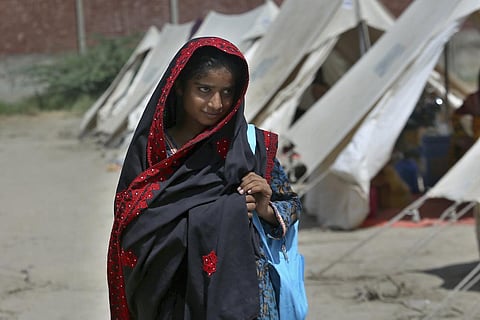

DADU, Pakistan: Every part of Rajul Noor’s life has been wrecked by this summer’s massive monsoon-driven floods. The 12-year-old girl’s family home is destroyed, as is the school that she loved. The friends she used to walk to school and play with are scattered, finding refuge elsewhere.
“Our whole world is underwater, and nobody has helped us,” she said, speaking in the tent where she, her parents and four siblings now live in Dadu district in Pakistan’s Sindh province.
Almost 100% of the district’s cotton and rice crops were destroyed. More than half its primary and secondary schools were fully or partially damaged, local officials say. Boats laden with people and their belongings crisscross Dadu, past buildings still partially submerged, weeks after the rains stopped. This level of damage is repeated in towns and cities across Pakistan.
The destruction has intensified the debate over a question of climate justice: Whether rich countries whose emissions have been the main driver of climate change owe compensation for the damage that change is inflicting on poor countries like Pakistan.
It’s an idea that developed nations have repeatedly rejected, but Pakistan and other developing countries are pushing for it to be seriously discussed at COP27, next month’s international climate conference in Egypt.
Pakistan in many ways crystalizes the debate. Scientists have said climate change no doubt helped swell monsoon rains this summer that dumped three and a half times the normal amount of rain, putting a third of the country underwater. At least 1,300 people were killed, and 33 million people in Pakistan have been affected.
Pakistan, which contributed only 0.8% to the world’s emissions, now faces damages estimated at more than $30 billion, more than 10% of its GDP. It must repair or replace 2 million damaged or destroyed homes, nearly 24,000 schools, nearly 1,500 health facilities and 13,000 kilometers (7,800 miles) of roads. Bridges, hotels, dams, and other structures were swept away.
“These 33 million Pakistanis are paying in the form of their lives and livelihoods for the industrialization of bigger countries,” Pakistani Foreign Minister Bilwal Bhutto-Zardari said on the sidelines of the U.N. General Assembly last month.
Climate Change Minister Sherry Rehman went further, saying rich nations owe reparations to countries hit by climate disasters.
Developed nations have refused anything that smacks of reparations, fearing the door will open to massive climate claims against them from around the world.
They agreed to give money to help poorer countries reduce emissions and adapt their infrastructure for future climate change, though they have been slow in providing the money. But at COP26 in Glasgow last year, the United States and European Union members rejected demands for a fund to compensate poor countries for “loss and damage” -- destruction already wrought by climate change.
“Bigger states are extremely concerned about liability. How long can they keep kicking the can down the road? They may at some point want to settle as the issue isn’t going to go away,” said Margeretha Wewerinke-Singh, assistant professor of international public law at Leiden University in the Netherlands.
She is lead counsel for the tiny Pacific island nation of Vanuatu in its pursuit of an advisory opinion on climate change from the International Court of Justice.
Wewerinke-Singh said there is a basis for legal action. International law says states have an obligation not to cause harm to the environment of other states. Violations can trigger an obligation to make reparation — either restoring the situation to what it was before or providing compensation.
Pakistan has two options, she said. It could go after states through an international body like the ICJ. But this avenue rules out China and the U.S., two of the world’s biggest greenhouse gas emitters, as they don’t recognize the ICJ’s jurisdiction. Or it could pursue cases against governments or fossil fuel companies in national courts.
She pointed to successful suits against tobacco companies for the harm caused by smoking.
“Climate change litigation is in its infancy. Tobacco litigation is an example of litigation that was construed to be far-fetched, but it really took off,” she said.